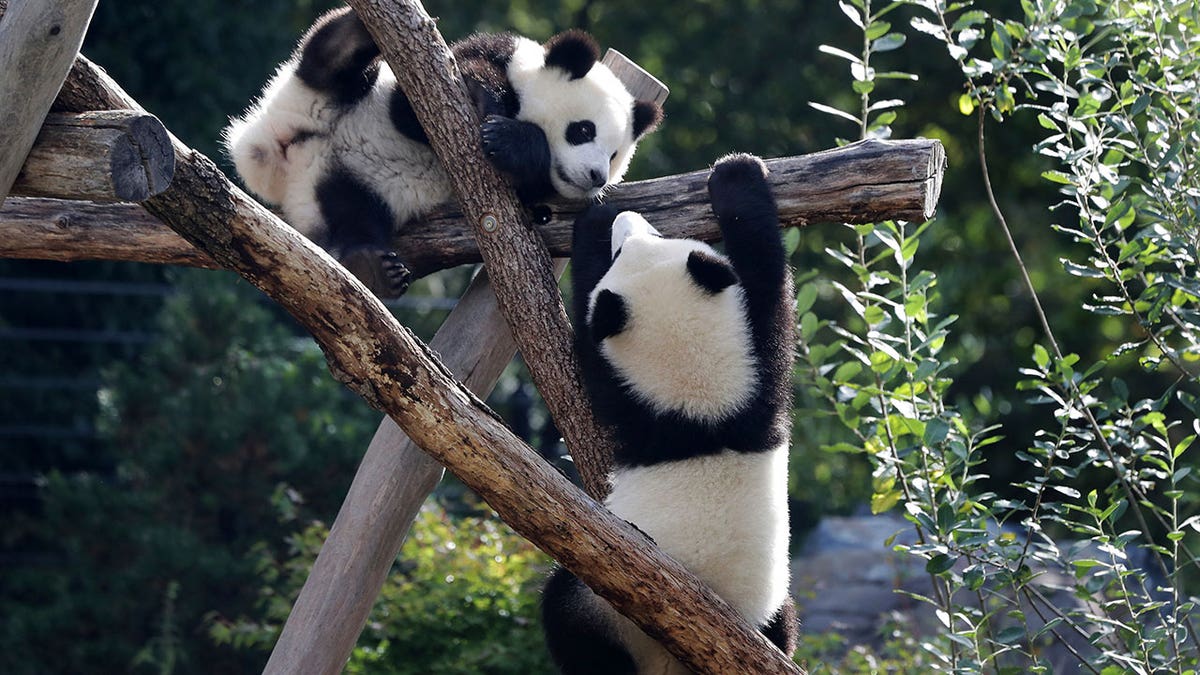Pandas play on gym set: Watch the adorable video
Baby pandas were caught on video playing on an at-home gym set at the Qinling Giant Panda Research Center in Shaanxi province, China. Check out these sweet pandas at play.
- The Berlin Zoo has sent the first giant pandas born in Germany, Pit and Paule, to China.
- Despite being a popular attraction in Berlin since their birth in 2019, the return of Pit and Paule to China was part of the contractual agreement from the beginning.
- The four-year-old pandas left Berlin on an Air China cargo jet and have arrived at their new home, the Chengdu Panda Base.
The Berlin Zoo has sent the first giant pandas born in Germany to China, dispatching the 4-year-olds on a journey that was delayed by the COVID-19 pandemic.
Pit and Paule, who also are known by the Chinese names Meng Xiang und Meng Yuan, departed from Berlin on Saturday aboard an Air China cargo jet and have now arrived at their new home, the Chengdu Panda Base, the zoo said Monday.
"Pit and Paule coped well with the flight," said Andreas Pauly, the zoo's head of animal health, who accompanied the panda brothers to China. "When the bamboo is right, pandas are usually very relaxed. It was the same on the flight."
ONLY 4 PANDAS LEFT IN US, BUT BIDEN-XI SUMMIT COULD REVERSE TREND TO 'DEEPEN' TIES
The pair will now spend 30 days in quarantine at the panda base.

Panda bear cubs Pit and Paule climb in their enclosure during their first birthday in Berlin, Germany, on Aug. 31, 2020. The Berlin Zoo has sent the first giant pandas born in Germany to China, dispatching the four-year-olds on a journey that was delayed by the COVID-19 pandemic. (AP Photo/Michael Sohn, File)
The young pandas were a star attraction in Berlin since their birth in 2019, but their return to China was contractually agreed from the start.
While China gifted friendly nations with its unofficial mascot for decades as part of a policy of "panda diplomacy,″ the country now loans pandas to zoos on commercial terms.
Pit and Paule’s parents, Jiao Qing and Meng Meng, arrived in Berlin in 2017. They are expected to remain in the German capital for another nine years.
GIANT PANDAS TO LEAVE THE NATIONAL ZOO IN D.C. FOR CHINA EARLIER THAN EXPECTED
When the young pandas turned 4 in August, the zoo said the animals would soon travel to China — a trip that it said generally happens when the animals are 2 or 3 but was delayed by the pandemic.
Giant pandas have difficulty breeding, and births are particularly welcomed. There are about 1,800 pandas living in the wild in China and a few hundred in captivity worldwide.

